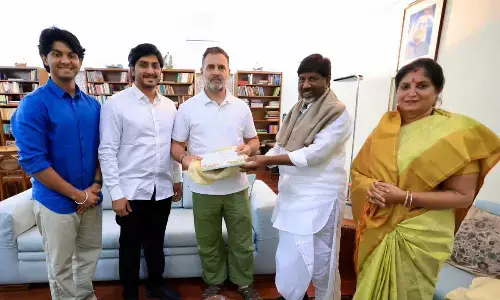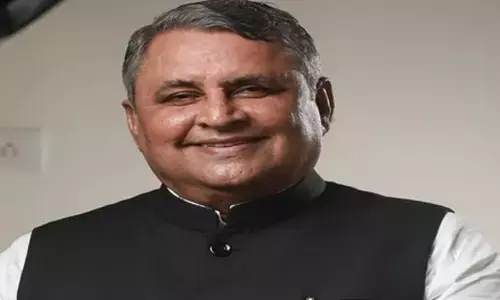Guidelines for engaging Professor of Practice in Universities and Colleges

Representational image
For skilling of youth at the optimum level, learners are required to think like employers and employers are to think like learners. Towards this, the UGC has taken a new initiative to bring the industry and other professional expertise into the academic institutions through a new category of positions called Professor of Practice.
The National Education Policy 2020 seeks to transform higher education by focusing on skill- based education to meet needs of the industry and the economy. Further, the NEP also recommends integrating vocational education with general education and strengthening industry-academia collaboration in HEIs.
For skilling of youth at the optimum level, learners are required to think like employers and employers are to think like learners. Towards this, the UGC has taken a new initiative to bring the industry and other professional expertise into the academic institutions through a new category of positions called Professor of Practice. This will help to take real world practices and experiences into the class rooms and also augment the faculty resources in higher education institutions. In turn, the industry and society will benefit from trained graduates equipped with the relevant skills.
Objectives
i. To develop courses and curriculum to meet the industry and societal needs and enable the HEIs to work with industry experts on joint research projects and consultancy services which will be mutually beneficial;
ii. To bring in distinguished experts from various fields such as engineering, science, technology, entrepreneurship, management, chartered accountancy (CA), commerce, social sciences, media, literature, fine arts, civil services, armed forces, legal profession and public administration into the academic institutions;
iii. To enable the higher education institutions to formally associate with persons of eminence and encourage them to participate in experiential learning, research, training, skilling, entrepreneurship and extension and to play mentoring role.
Eligibility
i. Distinguished experts who have made remarkable contributions in their professions from various fields such as engineering, science, technology, entrepreneurship, commerce, social sciences, media, literature, fine arts, civil services, armed forces, legal profession, community development, panchayati raj, rural development, watershed
development, water-harvesting, organic farming, small green energy systems, municipal planning, community participation, gender budgeting/planning, inclusive development of tribals and public administration among others. Those who have proven expertise in their specific profession or role with at least 15 years of service/experience, preferably at a senior level, will be eligible for Professor of Practice.
ii. A formal academic qualification is not considered essential for this position if they have exemplary professional practice in lieu. These experts will also be exempted from the requirement of publications and other eligibility criteria stipulated for the recruitment of faculty members at the Professor level. However, they should possess the skills to carry out the duties and responsibilities specified in the following section.
iii.The number of Professors of Practice in a HEI, at any point in time, should not exceed 10% of the sanctioned posts in a HEI.
Duties and responsibilities
i. Involve in the development and designing of courses and curriculum.
ii. Introduce new courses and deliver lectures as per institutional policies.
iii. To encourage students in innovation and entrepreneurship projects & provide necessary mentorship for these activities.
iv. To focus on enhanced industry-academia collaborations.
v. Conduct jointly in collaboration with regular faculty member of the institution, workshops, seminars, deliver special lectures and training programmes.
vi. Carryout joint research project or consultancy services in collaboration with the regular faculty member of the concerned HEI.
General conditions
i. The engagement of Professor of Practice will be for a fixed term.
ii. The engagement of Professor of Practice will be exclusive of the sanctioned posts of a university/college. It will not affect the number of sanctioned posts and the recruitment of regular faculty members.
iii. Professor of Practice is not open for those in teaching profession- serving or retired.
Categories of engagement
It is envisioned that Professor of Practice can be engaged in one of the following categories:
A. Professor of Practice funded by Industries
B. Professor of Practice funded by HEIs from their own resources
C. Professor of Practice on Honorary basis
A. Professor of practice funded by industries:
Today's industry looks for graduates with specific skill sets. But the higher education system is churning out graduates who fall short of the required skills. As a result, many industries now hire graduates and provide adequate training before employing them. Involving experts from industry in teaching will benefit both the industry and the higher educational institutions. For engaging industry experts and professionals in this category, HEIs may collaborate with the industries to support the Professor of Practice positions.
B. Professor of Practice funded by HEIs from their own resources
As per the policy directives of NEP 2020, graduate programmes are revised with the holistic and multidisciplinary approach. HEIs may assess the required gap areas in different fields and engage experts working in leadership positions in various fields. In this category, the remuneration for the Professor of Practice is made by HEIs from their own resources as indicated below:
Remuneration
Part-time/Full-time engagement: Consolidated amount, mutually agreed between the institution and expert.
C. Professor of practice on honorary basis
Experts fulfilling the eligibility criteria for the Professor of Practice may like to share their expertise with students and come forward to teach on honorary basis. Such experts may be engaged on honorary basis as Professor of Practice and their services may be utilized for the benefit of the students.
The HEIs may decide on the amount of honorarium to be paid to the Professor of Practice in this category from their own resources.
Procedure for selecting Professor of Practice
a) The Vice-Chancellors/Directors may invite nominations from eminent experts for Professor of Practice positions.
b) The experts willing to serve may also be nominated or they can send their nomination to the Vice-Chancellor/Director with a detailed biodata and a brief write-up about their potential contribution to the HEI.
c) Such nominations will be considered by a selection committee consisting of two senior Professors from the HEI and one eminent external member. Based on the recommendations of this committee, the Academic Council and the Executive Council or statutory bodies of the HEI will decide on the engagement.
Tenure
The engagement may be initially for up to one year. At the end of the initial engagement or subsequent extension, the HEI will make an assessment and take the decision about extension. The HEI will devise its own assessment procedure for extension based on the contribution and requirement of the experts engaged as Professors of Practice.
The maximum duration of service of Professor of Practice at a given institution should not exceed three years and is extendable by one year in exceptional cases and the total service should not exceed four years under any circumstances.










